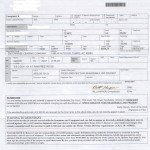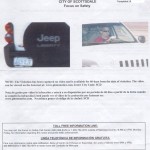Back in 2008, I was going to school out in Iowa. One of the first times I came home to visit my parents in Springfield, Ohio, I got my car out of the garage for a quick trip to a coffee shop. Halfway there, I was going 55 miles-per-hour in what I thought to be a 55 zone when I was pulled over by Deputy Brian Melchi of the Clark County Sheriff’s Department. He claimed that I was doing 55 in a 35. Now the road in question can be a little confusing. In Ohio, when you encounter a sign reading “Speed Zone Ahead,” this means you are currently in an area that has fallen back to the default 55 MPH limit and you are about to enter a speed zone. On the other side of the road (the oncoming lane from where I was driving), there is one of these signs. On my side of the road, there was no sign reading “End Speed Zone.” I had always assumed that the speed zone ended anyway, as I was familiar with the road and this is usually the case. Usually, but not always, the speed limits are symmetrical, particularly in cases like this where you are leaving the city and heading out into the country. So naturally when Deputy Melchi stopped me, I told him I thought it was a 55 zone. He said, specifically (and this is important for the court testimony I describe below), that it was only 55 MPH in the oncoming lane, but not in my lane, where it was still a 35 zone. At the time I figured he must be right. Afterall, there was no sign. It is still stupid to ticket somebody for accidentally breaking the law like that because it’s obviously not going to have a deterrent effect, but cops do this all day so it’s not that surprising.
But what was the real speed limit?
This is where it gets good. For good measure, I contacted the Clark County Engineer’s office. I very quickly learned that my intuition had been correct and that the speed limits were perfectly symmetrical on that road. Now this may seem a little incompetent given that the sheriff’s station was actually on this road, but it wasn’t posted so maybe Deputy Melchi couldn’t have known. Ticketing me could have been ethical if it hadn’t been for the things he wrote on the ticket to artificially inflate his case. One thing, which I pressed him on at trial, was that he checked “moderate” traffic when there were zero other cars in sight from the time he clocked me to the spot 1/4 mile up the road where he pulled me over. Second, the code he wrote wasn’t actually for speeding, but for “excessive speed.” This is actually an important distinction, and it could have been a way to hedge his bets if he was wrong on the speed limit, but it didn’t come up in court. It did make my defense less effective at court, however, as I technically needed to convince the magistrate that not only was I not speeding, but that I also was driving a safe speed. Finally, Deputy Melchi also wrote the incorrect block number on the ticket. He wrote 800 block on the ticket no more than a few minutes after verbally telling me 900 block! In reality even 900 block was inaccurate, as the numbers were much higher where he clocked me. Because there were two houses in the 800s before the speed limit changed, this also made my defense less clear.
My day in court
Of course I did fight the ticket, considering that I had been ticketed for doing 55 in a 55 zone. I subpoenaed the county engineer, Bruce Smith, and had him bring his records pertaining to the speed limits on the road in question. Before the trial the prosecutor illegally spoke to my witness without me present. At the time, I didn’t know it was a problem when he called him into a room, but I found out later that I should have been present for the discussion. In court, the shady prosecutor objected when I called my witness, saying I had already testified about the speed limit. The magistrate overruled it, luckily. The county engineer testified that the speed limit was exactly the same in both lanes. Deputy Melchi testified that he didn’t notice a sign saying that the speed limit had changed, but to his credit he was truthful. It is true that he may have had good reason to be wrong about that speed limit.
My problem at trial was that the prosecutor and Deputy Melchi both were spineless on the offense. If either one of them had any dignity, they would have dropped the charges after finding out that the county engineer was prepared to testify the exact opposite of what I had been told by Deputy Melchi at the side of the road. If I had been a real lawyer, I could have possibly pressed this discrepancy successfully on cross examination, but as Deputy Melchi’s car allegedly had no video and audio recording, it would have been difficult to prove what he said when he pulled me over.
The magistrate, Albert Stewart, found me guilty even though nobody ever really said anything coherent that resembled evidence that I was going above the speed limit. The magistrates in these types of cases are basically looking for any little shred of information to convict. The courts are funded with court costs paid by the losers and the magistrates/judges tend to have a soft spot for believing the cops are always right and that only a troublemaker would contest a traffic citation. The prosecutor threw him that shred of information when he asked me if I might have sped up early. He kept asking me to clarify what speed I was going at different points, but I never misspoke. Obviously I didn’t speed up early because I had turned onto the road just before the speed limit went to 55, but that was all the suspicion Magistrate Stewart needed to find me guilty. He even told me that he weighted Deputy Melchi’s testimony higher than mine, though this is a ridiculous notion because Deputy Melchi basically admitted to not knowing the speed limit. He did say that he liked my defense and thus he suspended the fine, which is convenient because he still got me to pay his court costs (which account for an absurdly high percent of the total cost at $138). I was also technically supposed to lose 2 points, but I never saw those hit my Arizona license. Overall, I’m confident that the government lost money on this matter, given that they paid a lawyer, a cop, a judge, and the county engineer to sit in court for 30+ minutes.
The system is basically a bunch of scumbags
On the way out of the courthouse, I asked Deputy Melchi if it is ever really about the truth. He indicated that he has no problem with the prosecution’s tactic. That’s funny, because at the scene he said that I would not have been speeding if I had been in the other lane, which is exactly the opposite of what the magistrate said. Deputy Melchi was in a position to stop the whole debacle, but it would have required admitting that he was mistaken.
Note that I unfortunately do not know the prosecutor’s name. I wish I did, because as I mentioned above I believe he illegally handled my witness and because he is scum for going after me so hard on a traffic case where I was obviously innocent. He deserves to have his name attached to this trial, but the only way for me to get it is to pay an exorbitant fee to get the transcript typed up. The prosecutor’s office doesn’t even have a record, allegedly.
So that’s the story about how Brian Melchi caused a poor college student to pay $138 for driving at exactly the speed limit.


Leave a Comment